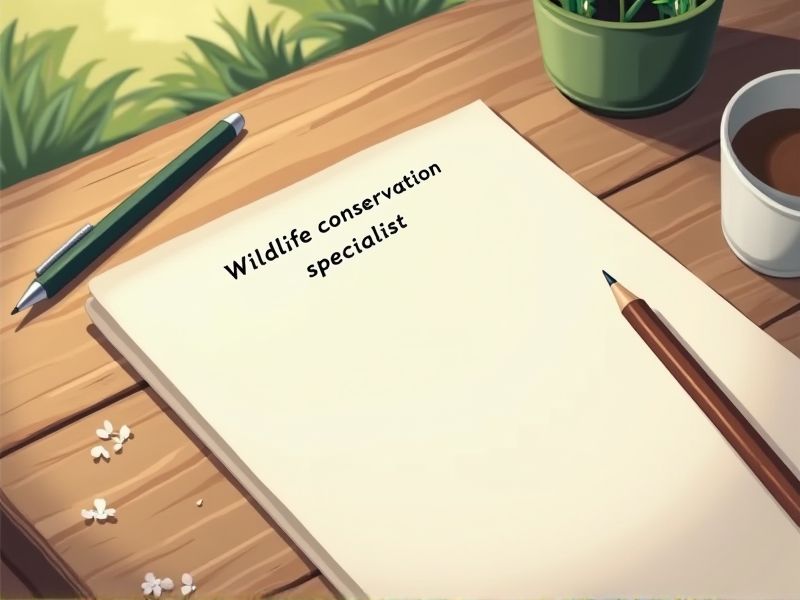
Wildlife conservation specialists often work at the intersection of biology, ecology, and environmental policy, requiring a comprehensive understanding of these fields. Certifications ensure that specialists are equipped with essential skills and knowledge for effective conservation efforts. Through accredited programs, specialists gain credibility and access to a network of professionals and resources. Key certifications provide a solid foundation for those pursuing success in wildlife conservation.
Certified Wildlife Biologist (CWB)
A Certified Wildlife Biologist (CWB) possesses specialized knowledge crucial for developing effective wildlife management plans. Rigorous education and field experience enable them to understand ecological dynamics and make informed conservation decisions. Their expertise in both biology and policy ensures compliance with environmental regulations, safeguarding biodiversity. With data-driven strategies, CWBs enhance habitat restoration efforts, directly impacting wildlife conservation success.
GIS Professional Certification (GISP)
GIS professional certification (GISP) is critical for wildlife conservation specialists because it enhances trust and credibility in their data analysis skills. Having a GISP certification signifies a commitment to ethical best practices and continuous professional development, which is crucial for effective wildlife management. Expertise in GIS tools allows conservationists to accurately map habitats and track species movements, supporting more informed decision-making. The certification also facilitates better collaboration with other environmental professionals who rely on geospatial data for conservation strategies.
Wilderness First Aid Certification
Wilderness First Aid Certification is crucial for wildlife conservation specialists because it equips them with necessary skills to handle medical emergencies in remote locations. Conservation work often takes place in isolated areas where immediate professional medical assistance is unavailable, making first aid expertise essential. Handling injured wildlife or engaging in field research can involve physical risks, and being certified ensures the specialist can provide initial medical care to themselves or team members. Certification fosters a safer working environment, enabling specialists to focus on conservation goals without undue concern for potential health risks.
Environmental Impact Assessment (EIA) Certification
EIA Certification equips wildlife conservation specialists with the skills to assess how proposed projects might harm ecosystems, ensuring protection of biodiversity. This certification provides standardized procedures to evaluate environmental risks, promoting informed decision-making in conservation efforts. In the absence of thorough impact assessments, development projects can inadvertently damage habitats, threatening species survival. Certification fosters accountability and transparency in environmental management, reinforcing trust between conservationists and stakeholders.
Natural Resource Management Certification (NRMC)
Natural Resource Management Certification equips wildlife conservation specialists with standardized skills crucial for effective ecosystem management. Certification provides a structured framework which enhances their ability to implement strategies for sustainable use of resources, directly impacting wildlife habitats. It ensures that specialists are up-to-date with the latest conservation techniques and regulations, fostering more informed decision-making. Knowledge from this certification also facilitates better collaboration with government agencies and other stakeholders, optimizing conservation efforts.
Habitat Restoration Certification (HRC)
Habitat Restoration Certification helps wildlife conservation specialists acquire standardized knowledge and methods essential for effective ecosystem repair. It enhances their skills in developing strategies that address habitat degradation, thus improving biodiversity resilience. Certification provides credibility, enabling professionals to secure funding and support for restoration projects. The HRC ensures that restoration practices align with the latest ecological research and conservation standards, promoting sustainable outcomes.
Certified Ecologist (CE)
Certified Ecologists possess specialized knowledge that deepens the understanding of ecosystems, which is critical for effective wildlife conservation strategies. Their certification ensures they are equipped to assess ecological impacts accurately, providing data-driven recommendations. They bring a multidisciplinary approach, integrating scientific and conservation principles to manage and restore habitats. Their expertise aids in formulating policies that balance ecological integrity with human development needs.
Project Management Professional (PMP) Certification
A Wildlife Conservation Specialist often manages complex projects involving habitat restoration and species recovery. Obtaining a PMP Certification equips them with essential project management skills that enhance their ability to plan, execute, and monitor these initiatives efficiently. It also helps in managing budgets and resources effectively, ensuring that conservation efforts are sustainable and aligned with organizational goals. As a result, the certification can lead to more successful outcomes in wildlife conservation projects, contributing to long-term ecological stability.
LEED Green Associate Certification
Wildlife conservation specialists with LEED Green Associate Certification understand the environmental impact of building projects, vital for protecting natural habitats. This certification helps them advocate for sustainable building practices that minimize disruption to ecosystems. By being knowledgeable in eco-friendly construction, they can collaborate effectively with developers on conservation efforts. Enhanced credibility also strengthens their influence in promoting sustainable development initiatives.
Sustainable Forestry Certification
Sustainable Forestry Certification ensures that logging practices maintain forest ecosystem health, which provides vital habitats for wildlife. Wildlife conservation specialists rely on these certifications to ensure biodiversity is protected and species are not displaced by deforestation. By promoting responsible forest management, these certifications help maintain ecological balance, crucial for preserving threatened and endangered species. Compliance with certification standards supports conservationists' efforts in monitoring and safeguarding wildlife populations effectively.
Summary
By obtaining certifications, you enhance your credibility as a wildlife conservation specialist, which can lead to increased trust and collaboration with stakeholders. You may gain access to more job opportunities and projects, given your validated expertise. Your decision-making could become more informed, resulting in better conservation outcomes. Your knowledge and skills are likely to contribute to the preservation of biodiversity and ecological balance.
